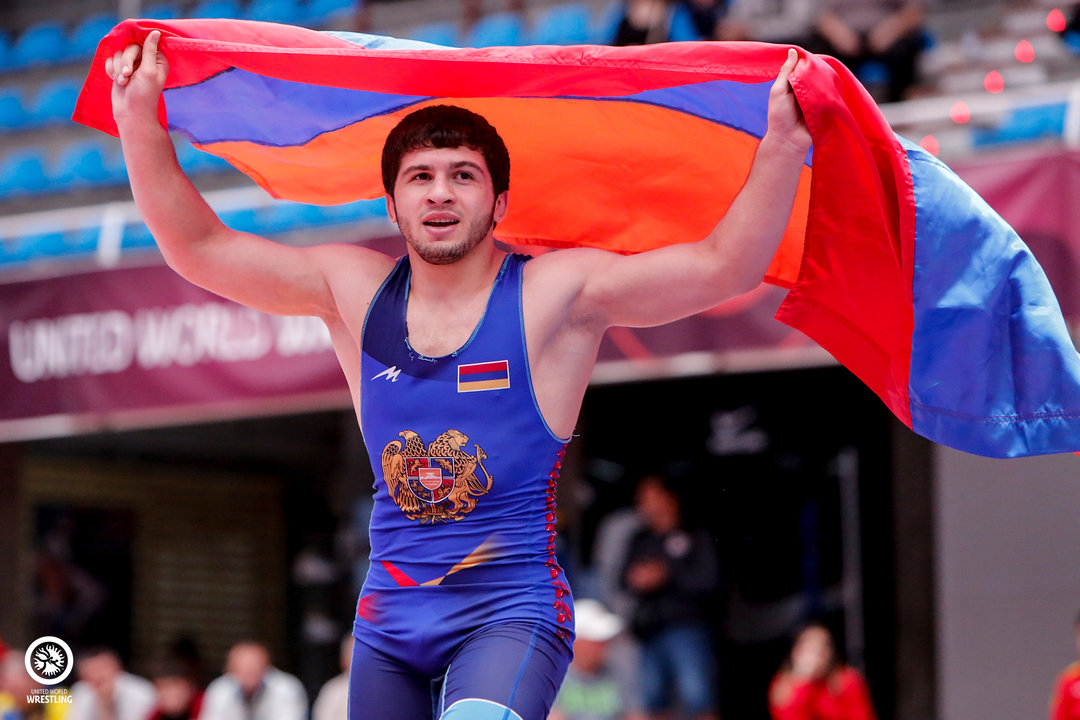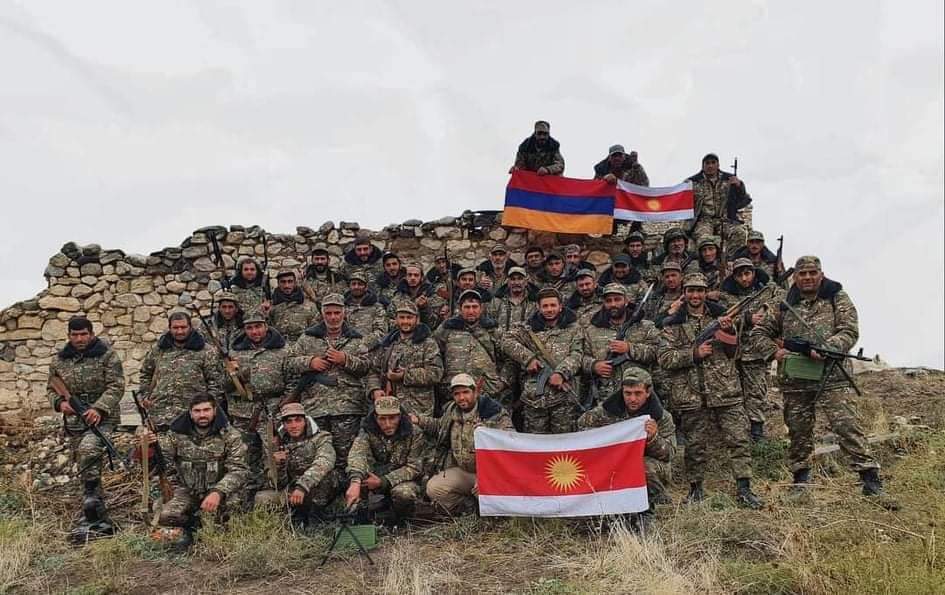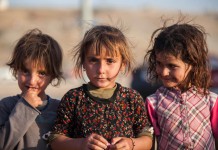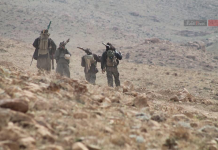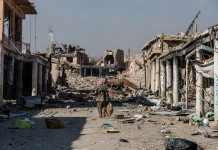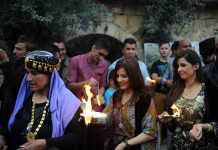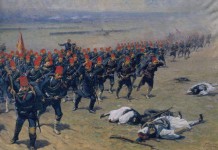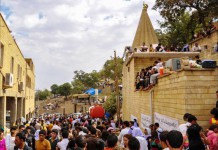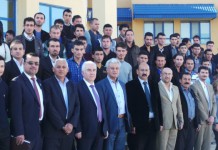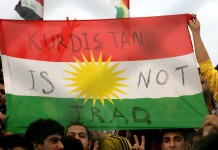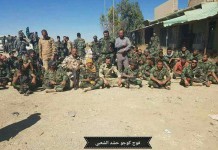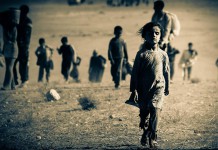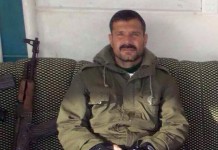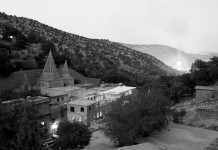“They will die, they will all die”, said a concerned Ezidi citizen on camera while thousands of soldiers of the Kurdistan Regional Government (KRG) were fleeing from the battlefield. It was August 3, 2014, the day on which the Islamic State overran the autochtonal settlement area of the Ezidi minority Shingal and committed a genocide. The Peshmerga commanders along with their 11,000 soldiers in charge of the region fled in the middle of the night and the early morning hours, leaving civilians to the executioners of IS. There would have been no genocide if the Peshmerga close to the Kurdistan Democratic Party (KDP) had fulfilled its duty and responsibility. A few hours of resistance would have been enough to save thousands of people from death and another thousands of women and children from slavery. At first it was said there had been a “tactical retreat” or Peshmerga forces did not have access to enough weapons for the defense of the region. Both claims have proven false.
The Kurdish president and supreme commander of the Peshmerga, Massoud Barzani, announced his intent to bring those responsible commanders to justice and punish them. Members of the KDP Central Committee furthermore announced to open an investigation into their Peshmerga´s flight from Shingal, including Ali Awni: “The Peshmerga have failed in their duties and abandoned their positions when they were not supposed to”. Clear words, which would be never followed by actions. Soon afterwards Barzani praised his Peshmerga and their courage in Shingal – the courage of those who had earlier abandoned women and children in order to rescue themselves.
An alleged investigation committee approved by Barzani interrogated, according to the KDP, 200 Peshmerga commanders who had been deployed in Shingal on August 3 and fled the area when the Islamic State launched its offensive. There have been neither results nor consequences.
The commanders who had been deployed in and around Shingal are still at large – loyal KDP members who can rely on their government to avoid prosecution. When the Peshmerga, the majority of whom were affiliated to the Kurdistan Democratic Party, abandoned head over heels their positions, Peshmerga fighters who were heading to Duhok opened fire and murdered several Ezidi Peshmerga members who had stopped their convoy and asked them to fight or to leave at least weapons behind in order to be able to defend themselves. Prior to this, Ezidis had been disarmed by the KDP´s Peshmerga who had promised them to take care of their security.
The Kurdish government, however, did not address the issue and undertook the attempt to rehabilitate Aziz Waysi, top commander of the Peshmerga´s Zerevani Brigade who fled from Zumar and opened the door for IS in the east of Shingal, in November 2015 with the help of “embedded journalists” covering the liberation of Shingal city. Waysi was theatrically portrayed by VICE News as a fearless commander, as if he had never been responsible for the region´s fall. He neither faced a conviction for committing a willful or grossly negligent violation of duty nor a serious investigation.

Today, two years after the genocide, the KDP-led Kurdistan Regional Government (KRG) is trying everything to conceal its Peshmerga´s complicity. While openly supporting the efforts for the recognition of the genocide against the Ezidis, the KRG has been at the same time trying to put its personal stamp on the narrative of what has happened in Shingal.
The Kurdish foreign minister Falah Mustafa, who happens to be a KDP member, submitted a report on Shingal to the office of the International Criminal Court in Den Haag. The report was drafted by the two Ezidi organizations Yazda and FYF which have done an incredible job for the Ezidi community. The report which Falah Mustafa has submitted to the ICC, however, does not once mention the Peshmerga forces´ flight from IS, underlining the pressure which the KDP has been trying to put on Ezidis. In a further, detailed and independently written report, however, Yazda drew attention to the Peshmerga´s flight from IS which eventually led to the fall of Shingal and allowed IS to conduct a genocide. Calling for justice for Ezidis, as Falah Mustafa does, while covering those responsible must be seen as an utter mockery.
A commission appointed by the UN Human Rights Council under Paulo Pinheiro to investigate IS crimes classified the terrorist organization´s atrocities against Ezidis as genocide and released a report stressing the Peshmerga´s central role for the region´s fall and ultimately the genocide. The Peshmerga, who were the only security force in the region, fled from the region without warning civilians, leaving the area and its people to Islamic State jihadists who faced little or no resistance, as the report says.
The commission therefore calls on the UN Security Council to take appropriate measures: „Of particular concern is an examination of the circumstances of the withdrawal of the Peshmerga from the Sinjar region as the ISIS attack commenced. […] Undertake a public and transparent investigation into the circumstances surrounding the withdrawal of the Peshmerga forces from the Sinjar region in early August 2014, and ensure the Yazidi community is involved and kept regularly apprised the work of the investigation“, states the report.
Muhammed Yusuf Sadik, Kurdish parliament speaker and member of The Movement for Change (Gorran), has, along with other parties, consistently called for the punishment of those Peshmerga commanders who have been responsible for the genocide.
Nechirvan Barzani, the prime minister of the KRG, told a delegation of members of the US Congress the recognition of the genocide against Ezidis and Christians was „one of the most important efforts of the Kurdish Regional Government“ – a farce. Opposition parties and independent individuals, on the other hand, continue to address the Peshmerga´s complicity, calling for a conviction of those responsible.
As the KDP government will know, a recognition of the genocide by the UN would also lead to the punishment of those responsible and an investigation into the events of August 2014. The responsible KDP members would therefore have to account for their activities before the International Criminal Court. Iraq, which the Kurdish region is part of, has, however, not ratified the Rome Statute. This plays right into the KDP´s hands and dimishes the chances to establish a Special Tribunal.
Before the KDP government goes on advocating for the recognition of the genocide, its officials should first fulfill their duty and call their responsible commanders to account. The Kurdish government will not be able to regain trust but should know better what value justice has after decades of asking for justice for Halabja. The question remains why Peshmerga forces ran before the ISIS onslaught and – as the video shows – apparently took a coordinated approach.
Besides Aziz Waysi, the following commanders and politicians have been directly responsible for the genocide in Shingal:

Seid Kestayi, commander of the KDP Peshmerga (Zerevani) in Shingal, fled from the region and opened the western Shingal front for IS terrorists. His moves allowed IS to besiege the Ezidis who had sought refuge in the mountains where hundreds of people died of thirst. Kestayi and his soldiers had fled to the safe north without warning civilians. He, too, neither faced a conviction for committing a willful or grossly negligent violation of duty nor a serious investigation. Kestayi continues to be free and enjoy his life.

Serbest Bapiri, head of the 17th KDP section in Shingal, deliberately did not answer phone calls of armed Ezidi civilians who had asked for help and reinforcements during the night of August 3, 2014. While Ezidis were calling for Peshmerga help in the south of the region, Bapiri was fleeing over the mountains before IS terrorists were even reaching the town. His refusal to answer the phone calls allowed IS to advance from the south and wipe out the few Ezidi defenders who put up resistance. The KDP commander was eventually set free after spending a few days under house arrest. There have been no more investigations. Bapiri has been living in Germany since and travels back and forth between Germany and Iraq.

Shewkat Duski, responsible for the KDP security forces (Asayesh) in Shingal, also fled during the night of August 3, 2014 from Shingal town. He had been apparently informed by Bapiri. The security forces who fled alongside their commander caused a security vacuum which the Sunni neighbors took advantage of to attack and enslave Ezidis before IS reached the town. Duski, who just as Bapiri was called for assistance, did not react. IS was thus able to capture the roads leading to the mountains and target innocent civilians. He too, was released after spending a few days under house arrest and does not have to fear judical consequences.
Other KDP commanders such as Tariq Sileman Herni and Musa Gerdi who fled from the north of the region in Rabia and allowed IS to attack and besiege Ezidi towns such as Khanasor and Sinune from the north also remain at large.
© ÊzîdîPress

